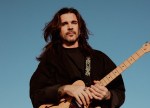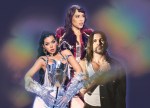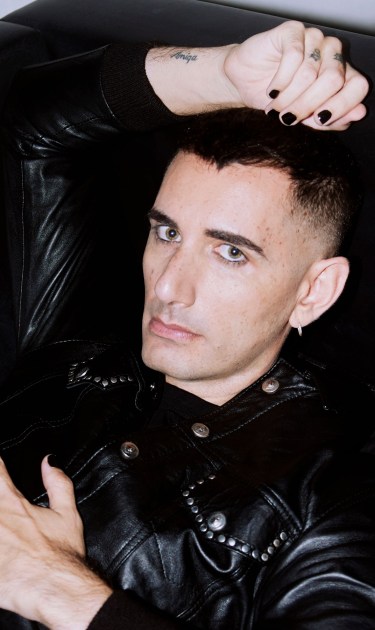“Most things we go through have happened before, and the world has somehow always been up in flames,” Alex Anwandter tells Remezcla calmly and collectedly, speaking from his central Brooklyn, NY, home. He likes reading history; he’s a nerd, he jokes. And although our current socio-political timeline has begun to feel more and more cursed every day, his statement holds true. Everything around us has always been up in flames when one really stops to think about it. It then becomes a matter of figuring out how to deal with it all in order to survive.
“I think it’s very important to find ways of focusing on making life feel like it’s worth living, and that has a lot to do with non-productive and other ways of communicating with each other, other ways of relating to each other,” he adds. “I think that involves both pleasure and questioning the world.”
The electronic pop provocateur’s capacious new self-produced album El diablo en el cuerpo touches on that insistence on the pursuit of pleasure (not to mention his affection for breaking the rules) in sensory-rich detail. On his latest project, Anwandter deviates from the political overtness of 2018’s Latinoamericana, where the Chilean artist weighed in on the wave of extreme conservatism and anti-LGBTQ rhetoric that spread across the world following Donald Trump’s win in the 2016 presidential election. Instead, he built what he describes as a “compendium of dance music” that immerses listeners in the sensual, pulsating energy of the discotheque.
Anwandter started demoing some of the first cuts off his fifth studio album from his home in New York during the early days of the pandemic. While crafting tantalizing pop songs when the world seemed at a standstill felt rather bizarre, he followed his initial instinct.

“Not to get all analytical, but maybe [it was] a natural reaction to mortality or thoughts of mortality to make something for the body, like to feel more alive,” he says. In that process, he realized that he wanted to focus on making it a more collaborative experience, so he looped in other musicians who energized El diablo en el cuerpo even more with string arrangements, live drums, trumpets, saxophones, qanun, and harps.
“There’s a lot of musicians in the album because I like the fact that dance music can have or had in the past this physicality of people playing music,” he notes. “I’m totally for drum machines, obviously. But I also like this force, especially when trying to do something like what I try to do, which is a type of dance music that somehow reflects a collective.” Additionally, the album boasts collaborations with iconic singer-songwriters like Julieta Venegas, electro-pop purveyors Buscabulla, and indie lifer Christina Rosenvinge.
“I think it’s very important to find ways of focusing on making life feel like it’s worth living, and that has a lot to do with non-productive and other ways of communicating with each other, other ways of relating to each other. I think that involves both pleasure and questioning the world.”
The A-side of El diablo en el cuerpo shifts from rapturous disco in songs like “Mi vida en llamas” to the sounds of early ‘80s underground jams bursting with craggy synth arpeggios and quavering drum machines in “Qué piensas hacer sin mi amor?.” Singles like “Maricoteca” blur the line between hazy memory and lascivious fantasy, while “Prediciendo la ruina” orbits around a euphoric, propulsive house-inspired beat.

On “Unx de nosotrxs,” he rallies with fellow Chilean pop powerhouse and queer trailblazer Javiera Mena in what is perhaps one of El diablo en el cuerpo’s most glorious, heart-stealing moments. It’s the equivalent of the coquettish and prolonged glances exchanged across a nightclub that live in your mind and play on the subtle art of what Anwandter calls gay recognition, an ongoing “I see you, you see me,” if you will. It’s a self-homage to growing up queer in Chile and the shared pain brought on by alienation that is shed once you find your chosen kin in a place like Santiago’s Club Blondie. It’s also an inside joke because the song title alludes to the outsider mantra in Tod Browning’s 1932 cult film “Freaks,” he notes. “They’re like circus freaks. When they meet someone new, another freak, they have this chant that goes, ‘One of us! One of us!’” he says as he laughs.
The LP’s B-side veers into more ruminative territory. The smoky “El diablo en el cuerpo” grapples with social condemnation and the consequences of chasing desire, while “Despertando” strips it down to Anwandter’s hypnotic vocals beside an orchestra and ethereal qanun. On “Tienes una idea muy antigua del amor,” he taps Venegas to tackle antiquated romantic dynamics. Together, they croon lines like, “Tienes una idea muy antigua del amor/Yo no soy tu dueño y tú no eres mi angel,” and, “Abre la puerta, deja perderme/Tienes que estar dispuesto a que no voy a volver a ti,” as the melodrama builds to an absorbing peak.
“Julieta is an eminence in all things love-related. She has taught us many, many things. I thought it’d be great to have her say this refrain that I go like into further explanation, but she gets to say the most important part,” says the artist.

Rather than ground itself in nostalgia overload, the album is a standout for the way it expels world-shattering levels of heartbreak and loneliness through the timeless language of dance music and manifests a more liberated world where one is not shamed for embracing their authentic self in an increasingly anti-queer climate.
“It’s important to me that it’s not a retro statement, but rather kind of a repurposing of history that we have and using that as a lens to view the current state of things,” Anwandter explains. “I like the idea of this exuberant, joyful dance music as being our response to crisis. Or about still-ongoing discrimination and inequality.”
Listen to El diablo en el cuerpo below.





